The Ultimate Summer Reading List for Startup Founders
40 libri che vi aiuteranno a passare da grandi a incredibili
Benvenuti ai giorni canicolari dell'estate!
As a startup founder, this time of year can feel a bit exhausting. Things tend to move slower and, for many places at the moment, the heat is unbearable. 🔥
Fortunatamente, l'estate è il momento perfetto per immergersi nei libri e imparare qualcosa di nuovo, o magari solo rispolverare qualche competenza.

That’s why we’ve compiled a list of 40 — yes, FORTY — books for startup founders to add to their summer reading list. 📚
This list includes a huge range of perspectives and topics, so that you can find what is most relevant to you, your company and what you’re currently trying to accomplish — whether that’s accessing funding, implementing sprints or testing out remote working options.
We’ve got you covered. 🙌
Plus, we’ve categorized the books in a list below, so you can easily find the topic you’re looking for.
Buona lettura!
Table of Contents
Leadership & Teamwork: 1–10
Product & Customers: 11–16
Growth & Marketing: 17–19
Strategy & Success: 20–29
Startup Life: 30–40
Leadership & Teamwork
1. Lean In: Women, Work and the Will to Lead by Sheryl Sandberg
Sandberg is, of course, the COO of Facebook, but she’s also very vocal about championing for women’s equality in the workplace — as evident by this book and the accompanying movement.

In 2010, Sandberg gave a TED talk in which she explained how women unintentionally hold themselves back in their careers. The talk has been viewed millions of times, and encouraged women to “sit at the table,” seek challenges and pursue their goals with gusto. 💪
This book continues in that same regard, and combines data, research and personal anecdotes to help change the conversation. It’s very practical in its approach, and includes advice on negotiation techniques, mentorship and building a satisfying career.
This instant classic is a must-read for startup founders — men and women alike — to better understand the biases and gender dynamics that exist in the workplace. And to combat them. 👊
2. The Five Dysfunctions of a Team by Patrick Lencioni
This (very) quick read is told as a fable — with very powerful lessons.
Lencioni delinea le cause della politica e delle disfunzioni dei team, nonché le chiavi per superarle.
As he suggests, the causes of dysfunction are both identifiable and curable. But that doesn’t mean it’s an easy process.
This is the perfect book for leaders in a company to better identify and understand dysfunctions and dynamics within their own teams — and to address any emerging issues. 🤝
3. The Culture Code: The Secrets of Highly Successful Groups by Daniel Coyle
Coyle’s book aims to answer questions such as, “Where does great culture come from?” and “How do you build and sustain it in your group, or strengthen a culture that needs fixing?” 🧐
Learn from some of the world’s most successful organizations, such as IDEO, the U.S. Navy’s SEAL Team Six and the San Antonio Spurs, and find out what makes them tick.
Throughout, Coyle identifies three key skills that generate cohesion and cooperation, and explains how diverse groups learn to function with a single “mind.” 🧠
Ricco di esempi, antidoti e consigli, questo libro cambierà il modo in cui percepite la cultura aziendale e cosa significa avere veramente potere sulla cultura che state coltivando.
4. Radical Candor: Be a Kick-Ass Boss Without Losing Your Humanity by Kim Scott
From a very early age, we’re often told that if you don’t have anything nice to say, don’t say anything at all. 🙊
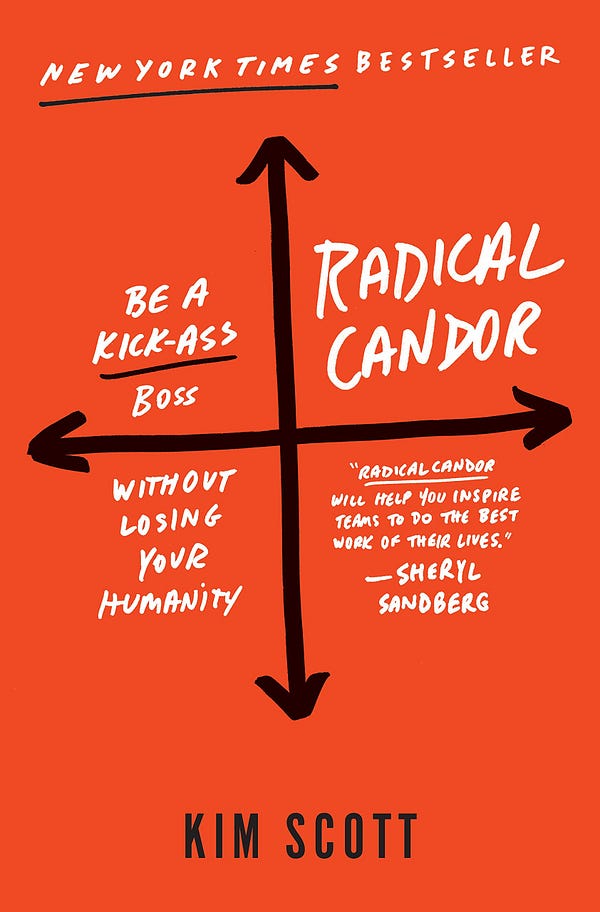
But, as many of us know, when you become a manager, it’s your job to say it. And your obligation.
Scott was an executive at Google and then at Apple, where she worked with a team to develop a class on how to be a good boss — she in turn came up with Radical Candor.
Radical Candor is a simple idea: to be a good boss, you have to “care personally” at the same time that you “challenge directly.”
Basically, when you challenge without caring, it’s obnoxious aggression. And when you care without challenging, it’s ruinous empathy. When you do neither, it’s manipulative insincerity.
This framework can help you build better relationships at work, and help with key responsibilities as a leader: creating a culture of feedback, building a cohesive team and achieving results you’re all proud of. 💛
5. The Startup Owner’s Manual by Steve Blank
This book is kind of a big deal, to put it lightly. It’s widely used by entrepreneurs worldwide, and many claim it’s one of the only books you ever need to start a business. 🤘
Vi guida, passo dopo passo, durante il processo di sviluppo del cliente. Il metodo è stato creato dal famosissimo esperto di startup della Silicon Valley Steve Blank, che ha contribuito a far progredire il movimento Lean Startup.
This how-to guide includes more than 100 charts, graphs and diagrams, plus 77 checklists that will guide you as you drive your company toward profitability. 📈
It’s definitely worth reading, and re-reading, if you’re a startup founder.
6. La cosa difficile delle cose difficili di Ben Horowitz
Horowitz is a co-founder of Andreessen Horowitz and one of Silicon Valley’s most respected and experienced entrepreneurs.
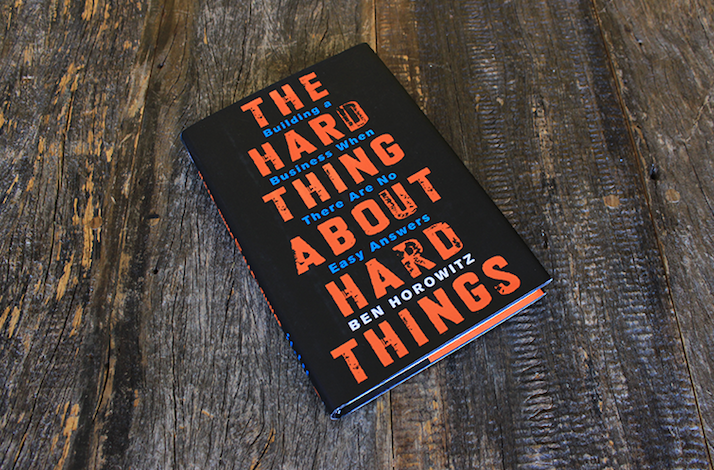
His book offers essential advice on building and running a startup — practical wisdom for managing the toughest problems business school wouldn’t cover, based on his popular blog. 👨💻
In a nutshell, he analyzed the problems that confront leaders every day and includes the insights he’s gained developing, managing, selling, buying, investing in and supervising technology companies.
It’s a funny and entertaining read, and is full of great advice and suggestions for how to handle some of the trickiest situations you can get into as a startup founder. 👍
7. Build Your Dream Network: Forging Powerful Relationships in a Hyper-Connected World by J. Kelly Hoey
Networking can be stressful for many, especially if it mostly feels like all you do is rub elbows at corporate cocktail events and add people on LinkedIn. 😓
Ma secondo Hoey, nell'era dei social media, è necessaria una tabella di marcia moderna per creare e coltivare connessioni significative per distinguersi dalla massa e raggiungere qualsiasi obiettivo, grande o piccolo che sia.
Hoey è una giornalista d'affari e un'esperta di networking che utilizza questo libro per presentare i suoi metodi per sfruttare le connessioni al massimo del loro potenziale.
It’s packed with amazing advice, pretty infographics and handy flowcharts that shows how small adjustments in your daily routine, generosity and goal-focused efforts can really set you apart. 😎
Hoey ha anche un suo blog su Medium, con lo stesso nome, con altri consigli e suggerimenti.
8. Superboss: Come i leader eccezionali gestiscono il flusso di talenti di Sydney Finkelstein
Finkelstein distills 10 years of research and 200+ interviews into this book to explain what makes a “superboss.” 💪
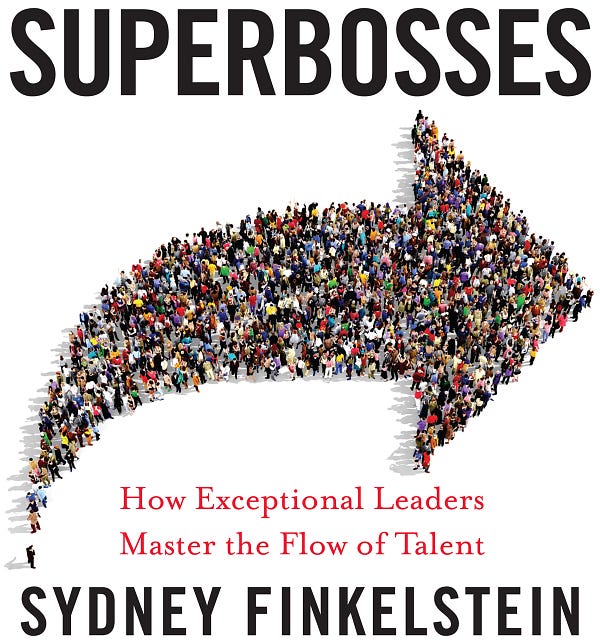
Ha scoperto che i superboss esistono in quasi tutti i settori e che, se si studiano i primi cinquanta leader in qualsiasi campo, ben un terzo di essi ha lavorato per un superboss.
While superbosses can differ in their personal styles, they all focus on identifying promising newcomers, inspiring their best work and launching them into highly successful careers. 👏
The perfect book for current leaders and future leaders alike — imagine a world full of superbosses!
9. Originals: How Nonconformists Move the World by Adam Grant
Grant affronta la sfida di migliorare il mondo con un tema centrale: essere originali.
He explains that it’s important to champion novel ideas, as it’s the thing that can create some of the most brilliant outcomes. ✨
Utilizzando storie e ricerche in diversi settori, approfondisce argomenti come riconoscere una buona idea, parlare senza essere messi a tacere, costruire una coalizione di alleati, scegliere il momento giusto per agire e come gestire la paura e il dubbio.
This book is perfect for any startup founders who want to go against the grain and challenge the status quo. 🤜
10. The Founder’s Dilemmas: Anticipating and Avoiding the Pitfalls That Can Sink a Startup by Noam Wasserman
Deciding whether or not you should bring friends, investors and others into your new business venture can be an insanely tricky process. 🤔
That’s where this book comes in.
The wrong decisions can ultimately cause your company to go under — even if it’s a promising business idea.
It even includes insider stories from founders like Evan Williams of Twitter and Medium, and Tim Westergren of Pandora, while utilizing quantitative data on nearly 10,000 founders. 📊
I problemi delle persone sono la principale causa di fallimento delle startup, quindi questo libro vi offre delle soluzioni.
Prodotti e clienti
11. Setting The Table: The Transforming Power of Hospitality in Business by Danny Meyer
Meyer, of Shake Shack and Gramercy Tavern fame, started Union Square Cafe when he was only 27 years old. He simply started with a good idea and some hopeful investors. 🙏
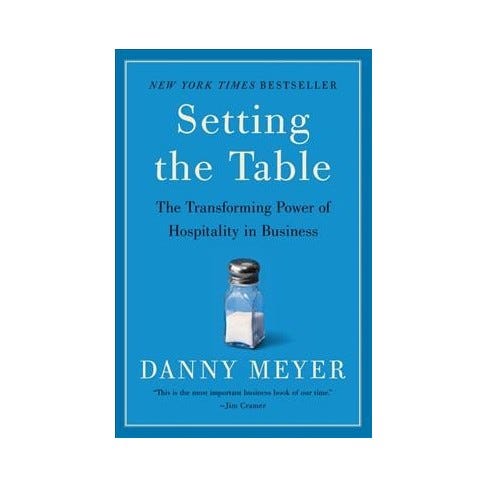
Now, he’s the co-owner of a restaurant empire.
But how did he beat the odds in one of the toughest industries out there? In this book, Meyer shares the lessons he learned in developing the philosophy he calls “Enlightened Hospitality.”
Startup founders can learn a lot from this book, regardless of industry, as it puts emphasis on the customers and your team — and the possibility to create something amazing. 😎
12. Hug Your Haters: How to Embrace Complaints and Keep Your Customers by Jay Baer
Come spiega Baer, gli haters non sono un problema, ma ignorarli lo è sicuramente.
Eighty percent of companies say they deliver outstanding customer service, but only eight percent of their customers agree. This book explains how you can close that gap by reconfiguring your customer service to deliver amazing experiences. 🙌
The research within this book is based on an extensive proprietary study of how, where and why we complain — and gives you suggestions for how to transform the way you handle haters and teaches you to even embrace them.
13. Hooked: How to Build Habit-Forming Products by Nir Eyal
How do successful companies create products people can’t put down?

Eyal addresses this by introducing the Hook Model — a four-step process that subtly encourages customer behavior. It’s a process that many successful companies have learned over the years in one variation or the other.
Through “hook cycles,” products can reach their ultimate goal of bringing users back again and again without depending on expensive advertising or aggressive messaging. 🔄
Questo libro è incredibilmente pratico e pratico e si rivolge a chiunque voglia capire meglio come i prodotti influenzano il nostro comportamento.
14. Will It Fly?: How to Test Your Next Business Idea so You Don’t Waste Your Time and Money by Pat Flynn
This book helps founders recognize whether or not their product or company is “clear for takeoff.” ✈
It’s full of practical advice that can be applied to any business, and focuses on action-based exercises and case studies to ensure that you’re ready to take your company to the next step.
Questo libro vi sfida a pensare in modo critico e ad agire deliberatamente con la vostra azienda.
15. The Sprint Book by Jake Knapp
Gli sprint di progettazione possono essere incredibilmente utili quando si tratta di creare grandi prodotti.
These sprints were invented at Google by Jake Knapp and perfected with more than 150 startups at Google Ventures, then shared with the world in this very book. 📖
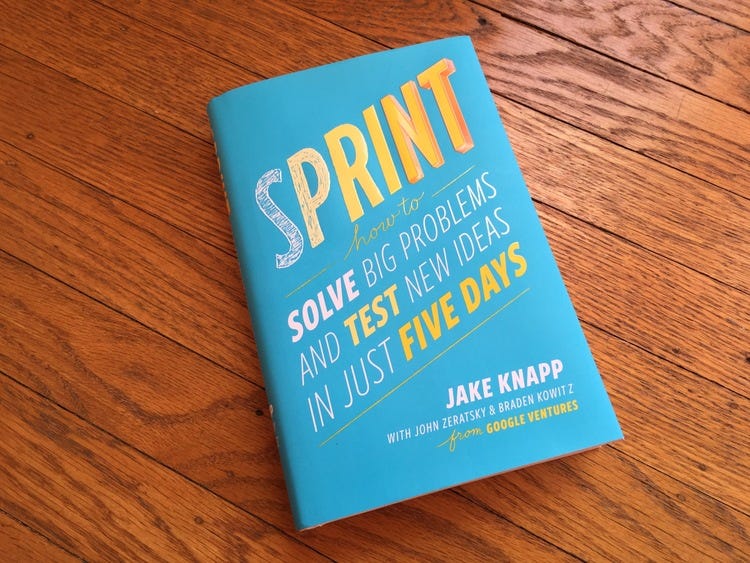
They also have an awesome website that’s packed with resources to help you implement design sprints in your company.
Definitely worth a read if you’ve been feeling stuck with needed changes to the UX/UI of your product, or just feeling like you aren’t feeling creative lately.
16. Come trasformare le vostre idee in prodotti software di Poornima Vijayashanker
The idea around this book is to help you create products people will pay for before they’re even built. 💰
Vijayashanker ha fondato tre startup e ha guidato personalmente oltre 100 persone che hanno lanciato diversi prodotti di successo.
Tutti i collaboratori di Vijayashanker hanno iniziato con diversi livelli di conoscenze tecniche e commerciali, o addirittura con nessuna, ma tutti si sono appassionati a un'idea e l'hanno portata avanti.
With the right roadmap and processes in front of you, it’s possible for you to launch a winning software product, too. 🗺
Crescita e marketing
17. Traction: How Any Startup Can Achieve Explosive Customer Growth By Gabriel Weinberg and Justin Mares
There are a lot of buzzwords in the startup world that can just be dismissed as platitudes, but this book brings up a word that actually means something: traction. 📈
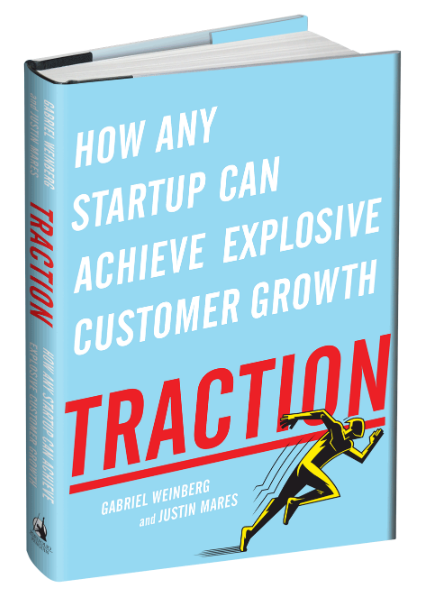
Come affermano Weinberg e Mares, probabilmente mentre fanno il provino per il ruolo di Capitan Ovvio, costruire un'azienda di successo è difficile.
And for every startup that grows to the point where it can go public or be profitably acquired, hundreds of others die out. ☠
Most people understand that while it’s nice to have a unique offering, a great team and a lot of funding, successful companies are successful because they’re capable of growth and acquiring new customers — aka your traction.
This book is worth checking out if you’re a founder who is struggling to grow a company or if you’re feeling a bit stuck and need some inspiration.
18. Competing Against Luck by Clayton M. Christensen et al.
L'autore di questo libro è considerato una delle massime autorità in materia di innovazione e crescita.
Written by a Harvard Business School professor and his colleagues, Christensen is THE guy when it comes to disruptive innovation and growing businesses. 😎
After years of research, they came to the conclusion that customers don’t buy products or services. They rather “hire” them to do “jobs.”
See where this is going? 😉
This book is all about the “Jobs to Be Done” approach and how you can implement it to help further grow your company.
19. Hacking Growth: How Today’s Fastest-Growing Companies Drive Breakout Success by Sean Ellis & Morgan Brown
Come fanno aziende come Facebook, Airbnb e Uber a crescere da umili origini fino a diventare le potenze che sono oggi?
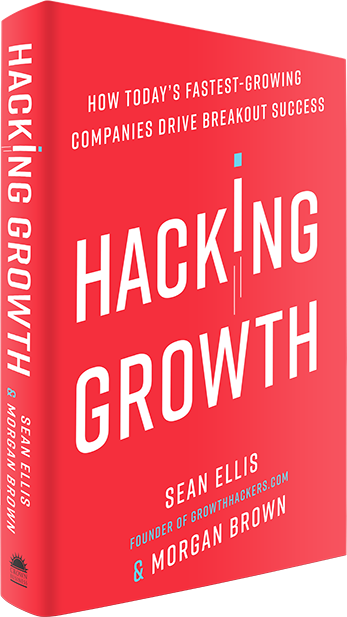
While many may think they just happened to build a great product and then crossed their fingers hoping it would catch on, we know better than that. 😏
There was a studied, carefully implemented methodology behind these companies’ extraordinary rise: growth hacking.
This book is all about how to implement growth hacking, and explains its purpose as a rapid-tempo testing and iteration that focuses on customers: attaining them, retaining them, engaging them, and motivating them to come back and buy more. 🤑
Strategy & Success
20. Good To Great: Why Some Companies Make the Leap…and Others Don’t by Jim Collins
Questo libro di management descrive come le aziende passano da buone aziende a grandi aziende e come la maggior parte di esse non riesce a compiere questa transizione.
Collins created a set of strict benchmarks and then spent more than 15 years researching “great” companies with his team and, well, this book was the end product. 📕
Dive into the “great” companies of the business world — from Coca-Cola to General Electric — and learn how they became the companies they’re known as today.
Tl;dr version for startup founders? The main reason certain companies become “great” is the fact that they narrowly focus the company’s resources on their field of key competence.
21. Thinking, Fast and Slow By Daniel Kahneman
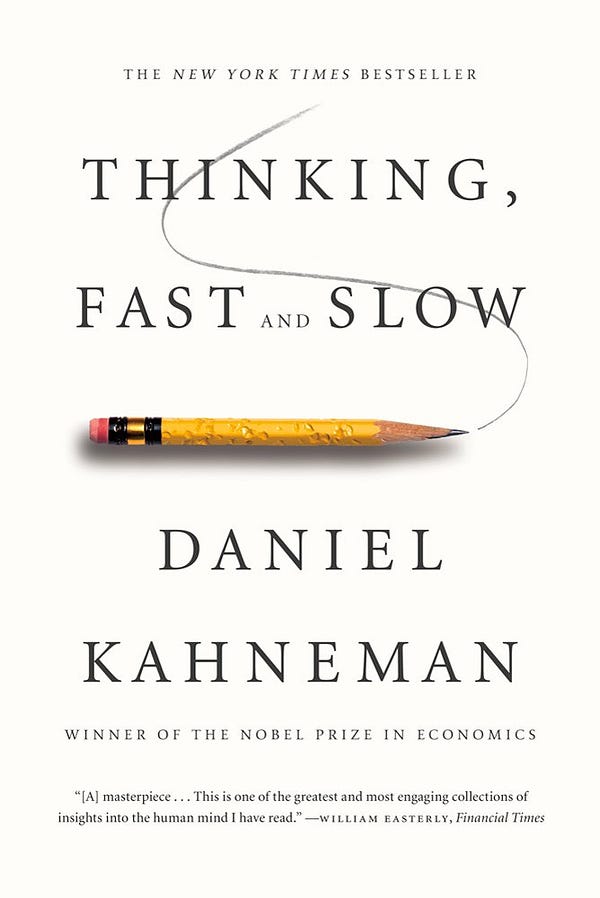
Scritto da un vincitore del Premio Nobel per le Scienze Economiche, questo libro è stato il vincitore del National Academies Communication Award 2012 per il miglior lavoro creativo che aiuta la comprensione pubblica di argomenti di scienza comportamentale, ingegneria e medicina.
Not bad. 😅
In poche parole, il libro riassume le ricerche che Kahneman ha condotto per decenni e tratta il concetto di avere due modalità di pensiero. Il Sistema 1 è veloce, emotivo e istintivo, mentre il Sistema 2 è logico, deliberato e lento.
This book can really change how you perceive your modes of thought, and is perfect for any startup founder looking for more understanding behind the psychology of how and why people think the way that they do. 🧠
22. Essentialism: The Disciplined Pursuit Of Less by Greg McKeown
Essentialism isn’t about getting more done in less time, but it’s rather about getting only the right things done. ⏲
It’s not a time management strategy, or a productivity technique. It’s a systematic discipline for discerning what is absolutely essential, then eliminating everything that is not, so we can make the highest possible contribution toward the things that really matter.
Sounds ideal, right? It’s definitely harder than it looks! 🏋
Essentialism is not one more thing to do — it’s instead a whole new way of doing everything. Check this book out if your work life is feeling cluttered!
23. Outliers by Malcolm Gladwell
Gladwell, as usual, takes this book as an opportunity to ask a pretty big question: what makes high-achievers different? 🤔
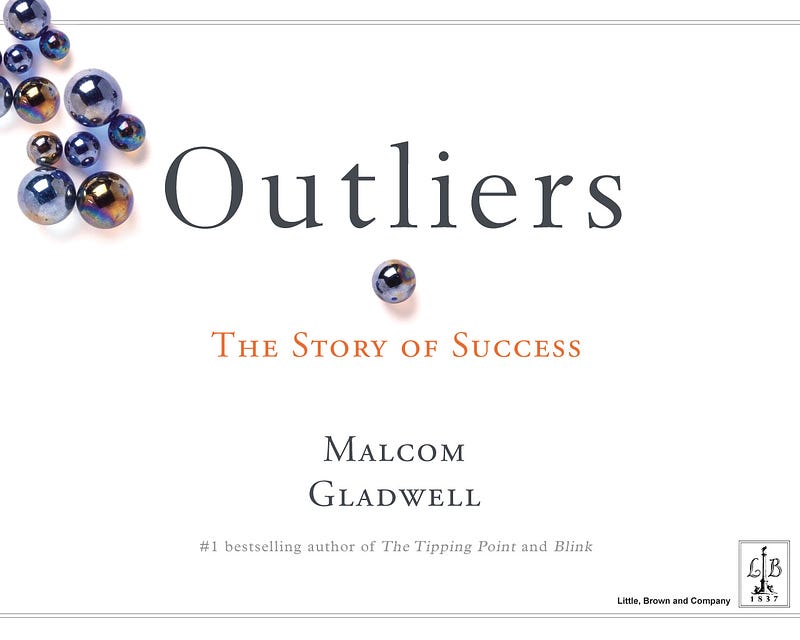
In breve, la sua risposta è che prestiamo troppa attenzione a come sono le persone di successo e non abbastanza alla loro provenienza.
Their culture, their family, their generation and the unique experiences of their upbringing can all play a factor. 👨👩👧👦
Nel corso del libro, include diversi esempi e aneddoti, come i segreti dei miliardari del software, il motivo per cui gli asiatici sono bravi in matematica e ciò che ha reso i Beatles una delle più grandi rock band.
Un libro ideale per chiunque voglia capire meglio come i grandi successi diventino grandi successi.
24. The Checklist Manifesto: How to Get Things Right by Atul Gawande
Yes, this book is about checklists — but it’s much more than that. ✅
Esplora ciò che l'idea della lista di controllo rivela sulla complessità delle nostre vite e su come possiamo affrontarla.
In quasi tutte le attività organizzate, ci sono molti fallimenti evitabili che si verificano a causa della complessità e del volume di conoscenze che dobbiamo fornire.
We train longer, specialize more, use ever-advancing technologies and we can still fail. 👎
Gawande argues that we can do better, using the simplest of methods: the checklist. Throughout the book, he explains what checklists can do, what they can’t do and how they could bring about revolutionary improvements in a variety of fields, to professions and businesses of all kinds.
25. Business Model Generation: A Handbook For Visionaries, Game Changers and Challengers by Alexander Osterwalder and Yves Pigneur
Se la vostra azienda ha bisogno di implementare nuove idee o di adattare i vostri prodotti, questo libro può essere di grande aiuto.
It features a highly visual design that takes powerful strategic ideas and tools, and makes them easy to implement in your organization. 👍
Inoltre, spiega i modelli di modello di business più comuni, basati sui concetti dei principali pensatori aziendali, e vi aiuta a reinterpretarli per il vostro contesto.
Include anche tecniche pratiche di innovazione utilizzate oggi da consulenti e aziende leader, come 3M, Capgemini, Deloitte e altri.
26. Mindset: The New Psychology of Success by Carol Dweck
Dweck is a Stanford University psychologist who spent decades on her research and discovered the simple yet mind-blowing concept that your mindset can be far more powerful than we thought. 💡
Secondo lei, può influenzare praticamente tutto nella vita.
As you’ve probably heard at some point, people with a fixed mindset — those who believe that abilities are fixed — are less likely to flourish than those with a growth mindset — those who believe that abilities can be developed. ↗
This concept emerged from Dweck’s research.
Il libro spiega come i grandi leader possono mettere in pratica questa idea per promuovere risultati eccezionali.
27. The Tools of Titans: The Tactics, Routines and Habits of Billionaires, Icons and World-Class Performers by Tim Ferriss
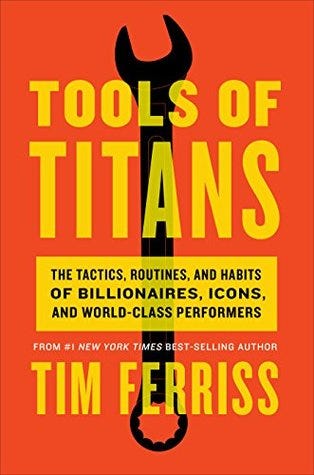
From the author of The 4-Hour Workweek, Ferriss is back with a collection of ideas and advice that he’s collected from over two years from the interviews he conducted for his podcast.
As he explains, this book contains the “distilled tools, tactics, and ‘inside baseball’ you won’t find anywhere else.” 🙌
If you enjoy learning from the best of the best, this collection of interviews is full of nuggets of wisdom and insight from some of the most fascinating and successful modern-day figures. 👏
28. What to Do When It’s Your Turn (And It’s Always Your Turn) by Seth Godin
Godin’s book is unique, which isn’t surprising, since Godin is a very unique person to begin with.
This book is his urgent call for you to do the work you’re hiding from, a manifesto about living with things that might not work and to embrace tension when fulfilling your passions. 🎨
It’s in full color throughout. As it’s described, it feels more like a high-end magazine than a book, and even people who hesitate to buy and read startup books will be engaged by this one.
Godin explained that the format is new for him and as far as he knows, no author has written a book quite this way. 📚
It’s a very urgent, personal, in-your-face read — perfect for those who want something a little different.
29. The Happiness Track: How to Apply the Science of Happiness to Accelerate Your Success by Emma Seppälä
In Seppälä’s book, she draws upon the latest scientific research on resilience, willpower, compassion, positive stress, creativity and mindfulness. 💆
Perché? In sintesi, per svelare il legame tra felicità e successo e come raggiungere entrambi.
Startup founders can greatly benefit from this book, as it helps you put things into perspective, and can help you incorporate positive stress and mindfulness in your everyday life. 🧘
Vita da startup
30. Lost And Founder: A Painfully Honest Field Guide to the Startup World by Rand Fishkin
Fishkin, the founder and former CEO of Moz, discusses in this book how traditional Silicon Valley “wisdom” leads too many startups astray.
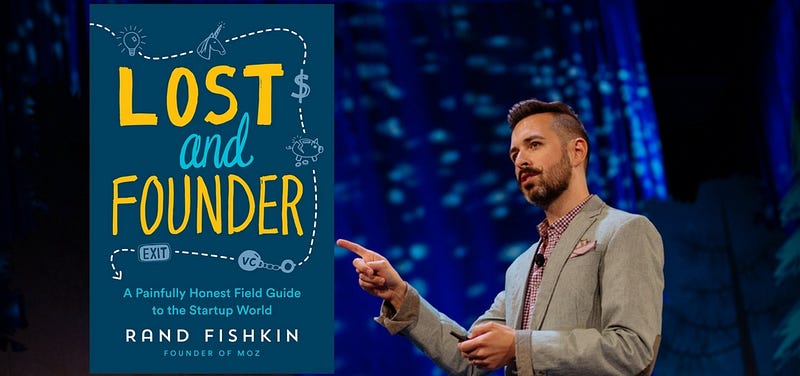
The “typical” idea of a startup story involves a young, brilliant entrepreneur who has a cool idea, drops out of college, overcomes everything, makes billions and becomes the envy of the technology world.
But that’s not this story. 🙅
While Moz is now a $45 million/year business and Fishkin one of the world’s leading experts on SEO, his business and his reputation took fifteen years to grow.
His company didn’t start in a Harvard dorm, but rather as a mother-and-son family business that fell deeply into debt.
Read Fishkin’s learnings and advice — this book is packed with nuggets of wisdom — always in his clever and fun style of writing. 👍
31. The Lean Startup by Eric Ries
To put it bluntly, many startup failures are preventable. 😧
The Lean Startup is an approach that’s being implemented all over the world. It’s changing the way companies are built and new products are launched.
If you aren’t implementing it yourself, you’ve probably at least heard of it.
In any case, this book is your definitive guide to the Lean Startup approach and how you can try it out with your own company — and most importantly, what you can learn from it. 💪
32. La startup $100: Reinventare il modo di guadagnarsi da vivere, fare ciò che si ama e creare un nuovo futuro di Chris Guillebeau
Guillebeau ha identificato circa 1.500 persone che hanno costruito imprese che guadagnano $50.000 o più da un investimento modesto (in molti casi, $100 o meno), e da questo gruppo ha scelto di concentrarsi sui 50 casi di studio più interessanti per questo libro.
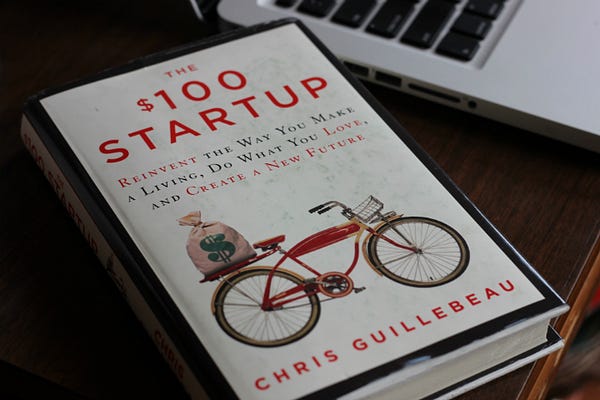
In nearly all cases, people with no special skills discovered aspects of their personal passions that could be monetized, and were able to restructure their lives in ways that gave them greater freedom and fulfillment. 💸
Questa guida è ricca di lezioni preziose sul business e sulla realizzazione di sé. Vale la pena di leggerla per coloro che stanno ancora esplorando le loro intersezioni di competenze e ciò per cui le persone sono disposte a spendere soldi.
33. Startup Playbook by Sam Altman
Y Combinator dedica molto tempo alla consulenza delle startup.
Sebbene la consulenza individuale sia fondamentale, Altman ha deciso che avrebbe potuto aiutare Y Combinator a scalare se fosse riuscito a distillare le parti più generali di questi consigli in una sorta di manuale che avrebbero potuto fornire alle aziende di YC e YC Fellowship.
Eventually, he thought that they should just give it to everyone. 🙌
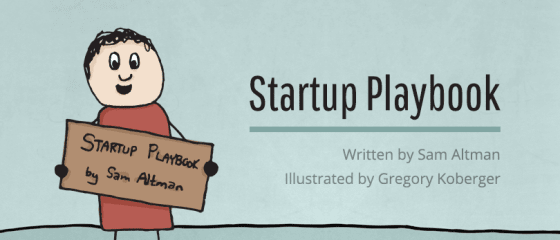
This book is meant for people new to the world of startups. Most of this will not be new to people who have read a lot of what YC partners have written — but the goal is to get it into one place.
It’s a quick read, plus it’s free and available right here. 👈
34. Venture Deals: Be Smarter Than Your Lawyer and Venture Capitalist di Brad Feld e Jason Mendelson
There is (or was) very little reliable information focused on venture capital deals. 🤷
So, Feld and Mendelson decided to change that. For more than twenty years, they’ve been involved in hundreds of venture capital financings, so they decided to share their experiences in the field by creating this book.
Perfect for those both new to, and experienced with, getting funding and working with VCs. This book goes through detailed explanations of terms sheets and explains the process in full. 📑
35. Founders at Work: Stories of Startups’ Early Days by Jessica Livingston
Questo libro è una raccolta di interviste ai fondatori di famose aziende tecnologiche su ciò che è accaduto nei primissimi giorni.
And while these people are mostly all celebrities now, what was it like for them when they were just a couple friends with an idea? 👫
Fondatori come Steve Wozniak di Apple e Max Levchin di PayPal raccontano, con parole loro, le affascinanti scoperte fatte imparando a costruire un'azienda dalle fondamenta.
These interviews are definitely required reading for anyone who wants to understand business. 👨💼
36. Startupland: How Three Guys Risked Everything to Turn an Idea into a Global Business by Mikkel Svane
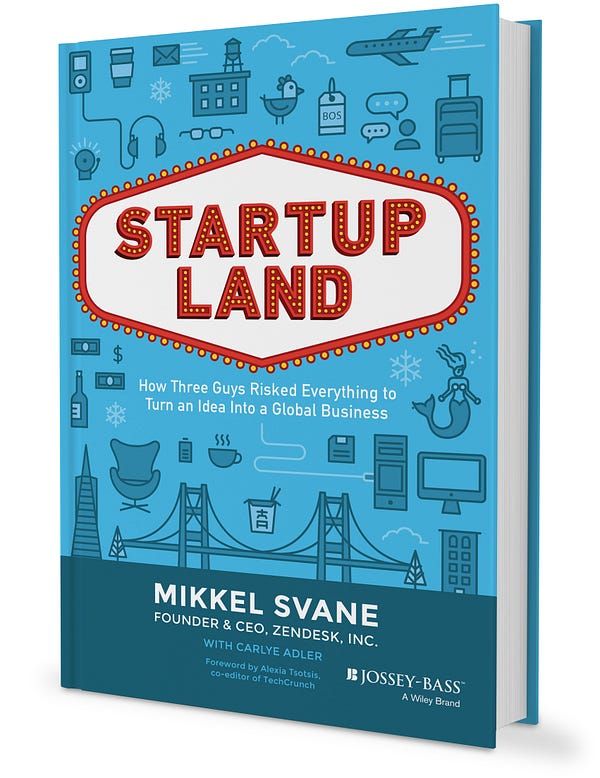
This book is basically the entertaining and high-stakes origin story of Zendesk’s explosive rise to startup fame.
Zendesk had a pretty unconventional start — for starters, it was founded in Copenhagen rather than Silicon Valley. 🇩🇰
Svane and his friends left their dull corporate jobs, risking everything secure in their lives, and managed to create one of the hottest enterprise software companies around. 🔥
It’s a fast-paced, sometimes funny read, definitely to be appreciated and related to by fellow startup founders.
37. A distanza: L'ufficio non è necessario di Jason Fried e David Heinemeier Hansson
La vostra azienda sta pensando di adottare una politica di lavoro a distanza? Allora questa è una lettura obbligata.
Written by the co-founders of the much-beloved Basecamp, this book dives into the pros and cons of remote work, what to expect and even gives real-life examples. 👩💻
Come affermano, il lavoro a distanza aumenta il pool di talenti, riduce il turnover, diminuisce l'ingombro degli immobili e migliora la capacità di condurre gli affari attraverso diversi fusi orari, solo per citare alcuni vantaggi.
38. The Year Without Pants: WordPress.com and the Future of Work by Scott Berkun
Sapevate che quasi il 20% dell'intero web utilizza il software WordPress?
The force behind WordPress.com is a convention-defying company called Automattic, Inc., whose 120 employees work from anywhere in the world, barely use email and launch improvements to their products dozens of times a day. 💪
Con una frazione delle risorse di Google, Amazon o Facebook, hanno un impatto simile sul futuro di Internet.
But how? 😳
Berkun worked as a manager at WordPress.com, and this book is a collection of his secrets and insights from his time there. It’s a great read for anyone looking for fresh perspectives on creativity, productivity and leadership — and a company that is potentially a model for the future of work.
39. The Everything Store: Jeff Bezos and the Age of Amazon by Brad Stone
Who doesn’t love a good company biography? 😅
Stone dives into the world of Amazon, and offers a fascinating look into Jeff Bezos’s life and how Amazon came to be the company it is today.
It’s a very telling, insightful book — and it gets to the heart of how and why Amazon functions the way that it does. 📦
40. Startup: A Novel by Doree Shafrir
Per concludere, un romanzo.
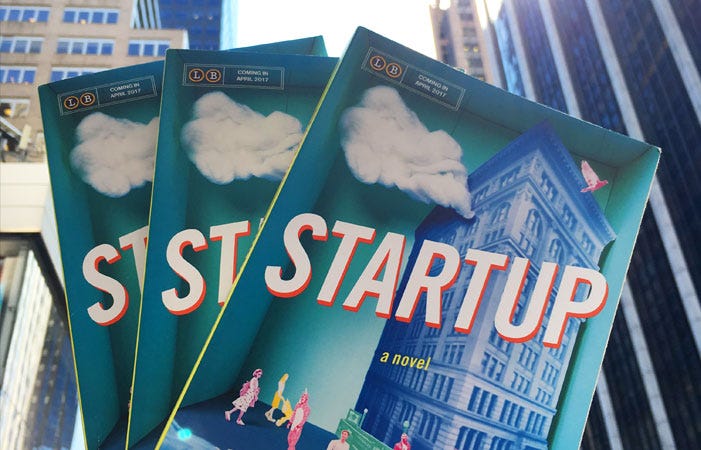
Shafrir is a veteran online journalist and BuzzFeed writer, who has written her debut novel all about the world of startups. It’s a sharp, hugely entertaining story of youth, ambition, love, money and technology’s inability to hack human nature. 💻
È sicuramente una storia divertente e comprensibile per chi lavora nel mondo delle startup.
We hope you find some new, inspiring books in this ultimate reading list! 😄
Be sure to let us know your favorites from this list in the comments — or if you think there’s another book that deserves to be here.
Vi è piaciuto questo post? Se ti è piaciuto, diffondi la notizia!
Per ulteriori informazioni su startup, growth marketing e vendite:
- 22+ Best Sales Podcasts You Should Check Out in 2024 - 21 Dicembre 2023
- Scritture di chiamata a freddo per esseri umani reali - 21 settembre 2023
- Gli oltre 25 migliori strumenti di vendita per aiutare il vostro team ad avere successo - 10 Agosto 2023
